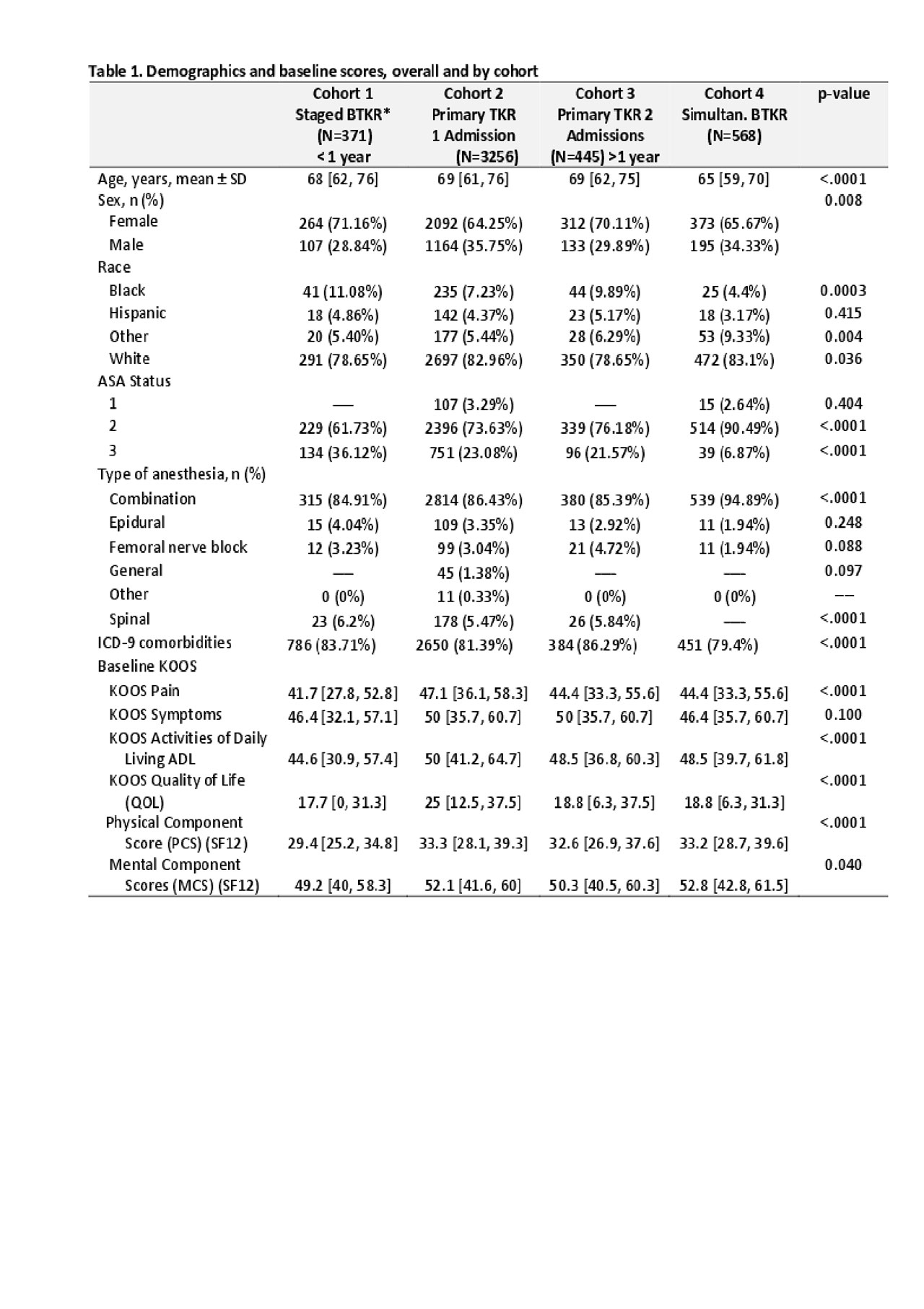Session Information
Session Type: Poster Session (Monday)
Session Time: 9:00AM-11:00AM
Background/Purpose: The safety of bilateral total knee replacements (BTKR) under the same anesthesia as compared to staging within 12 months is debated. The advantage is one anesthesia, one postoperative rehabilitation and a shorter recuperation., but may . incur greater risk of complications and readmissions, Our aim is to compare the rate of readmissions for patients undergoing 1) simultaneous BTKR 2) unilateral TKR, 3) staged BTKR >12 months or 4) staged B TKRs < 12 months.
Methods: All New York State (NYS) residents enrolled in the Hospital for Special Surgery Knee Replacement Registry >18 years old with a first primary TKR between 1/1/2008 and 12/31/2010 were eligible. We excluded prior revision TKR, inflammatory arthritis, 2 non-TKA surgical procedures. Demographics and PROs(HOOS/KOOS and SF12) were collected at the time of surgery. We used the NY Statewide Planning and Research Cooperative System (SPARCS) to identify readmissions via links to claims from all non-federal NYS hospitals. The cohorts were 1) simultaneous BTKR 2) unilateral TKR, 3) staged BTKR >12 months or 4) staged B TKRs < 12 months. Included readmission diagnoses were the Center for Medicare and Medicaid (CMS) Complications (TKR specific) and cerebral vascular accident ,acute renal failure, GI bleed, and mortality within 90 days. The distribution of continuous variables was assessed using the Shapiro-Wilk test. Non-normally distributed variables are summarized as median [IQR] and compared using the Kruskal-Wallis test. Categorical variables are summarized as frequency (percent) and compared using the Chi-Squared test.
Results: We included 4,640 patients linked to SPARCs with 95 unplanned readmissions (Table 1). Simultaneous BTKR patients were younger, more often male, had fewer co-morbidities, and had higher rates of American Society of Anesthesiology Score of 2. Health related QOL at baseline was better for simultaneous BTKR than staged < 1 year on the SF-12 PCS and SF-12 MCS . More staged < 1 year were readmitted, however there was no significant difference in readmission across the four cohorts compared (p=.961). At >90 days, there was a trend towards significance in readmissions for transfusions (p=.090) across the four cohorts. Readmissions for sepsis differed across the four cohorts (p=.019), with higher rates in the simultaneous BTKR group. No differences in VTE or MI were observed. Readmission for mechanical complications at >90 days differed across the cohorts (p=.0006) with a slightly increased rate of readmission in those staged < 1 year.
Conclusion: Further study is required to address whether simultaneous BTKR increases risk for readmission, compared to BTKR staged < 1 year. BTKR patients in our institution were younger and had less comorbidities,, which may reflect careful screening for simultaneous BTKR candidates, and the comparatively lower rates of early readmission for simultaneous BTKR patients (with the exception of readmission for sepsis). While we observed potentially meaningful differences in rates of readmission for transfusions, sepsis, and mechanical complications, across four cohorts of TKR replacement patients, these unadjusted comparisons require additional research.
TKR- Total knee replacement; KOOS-Knee Injury and Osteoarthritis Outcome Scores; SF-12 Short Form1; ASA- American Association of Anesthesiologists
To cite this abstract in AMA style:
Russell L, Mehta B, Lai E, Finik J, Tornberg H, Do H, Bass A, Sculco P, Sculco T, Poultsides L, Memtsoudis S, Goodman S. Readmissions After Staged vs Simultaneous Bilateral Total Knee Replacements (TKR) [abstract]. Arthritis Rheumatol. 2019; 71 (suppl 10). https://acrabstracts.org/abstract/readmissions-after-staged-vs-simultaneous-bilateral-total-knee-replacements-tkr/. Accessed .« Back to 2019 ACR/ARP Annual Meeting
ACR Meeting Abstracts - https://acrabstracts.org/abstract/readmissions-after-staged-vs-simultaneous-bilateral-total-knee-replacements-tkr/

